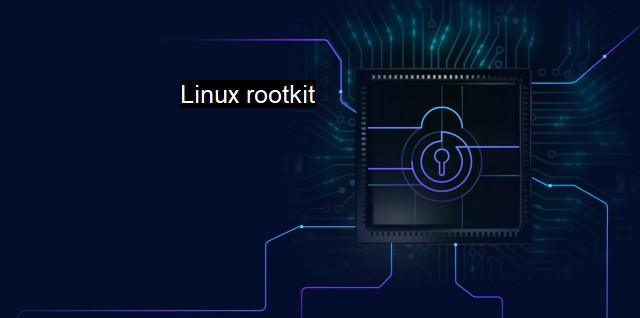What is Linux rootkit?
Unmasking the Danger: Exploring Linux Rootkits and Cybercriminals' Malicious Intent
A "Linux rootkit" is a malicious software invention capable of infectaging consequenceses primarily in the cybersecurity field, especially in the context of antivirus deployment and management. A primary concern in the digital world, rootkits in a Linux-based context, are fast becoming a major challenge to cybersecurity experts.Understanding what a Linux rootkit is necessitates a foundational comprehension of rootkits in general. A rootkit, by generic definition, refers to a collection of computer software, typically malicious, designed to enable unauthorized access to a computer or in computer networks. This admittance often leads to theft or alteration of stored data. The term rootkit stems from two words: "root," which is Linux's terminology for system administration rights, and "kit," denoting the array of software components required to implement a specific functionality.
A Linux rootkit, an iteration of this malicious software, is specifically designed to target Linux-based systems. Linux, an open-source operating system modeled on UNIX, has broad usage in servers and other big iron systems such as mainframe computers and supercomputers.
Linux rootkits can elevate user privilege, log keystrokes, conceal system processes and files, whilst stealing network data streams. They often install themselves as device drivers or kernel modules to gain unrestricted access to the targeted machine—enabling them to tamper with system parameters or kernel functionalities and bypass regular authentication mechanisms.
What rewards Linux rootkit its notorious reputation among cybersecurity circles and antivirus platforms is its methods of exploiting the system. Typically, it exploits loopholes in operating systems, equipping them with sweeping rights to modify system files and processes at their discretion. This potency distinguishes it from other malicious software categories often curtailed by restrained access rights. Rootkits can also burrow themselves deep into the operating system that antivirus software can be rendered ineffective.
Leveraging its discrete operative style, a Linux rootkit can corrupt system files, modify system parameters, and attach itself to kernel functionalities without leaving a trace. This capacity for stealth extends to their authority to alter system logs that document system activities and file changes. When an intruder controls these registries, they can manipulate this mechanism to conceal their activities and render their footprints invisible to detection frameworks, reinforcing the idiom of the perfect crime.
But cybersecurity and antivirus management is continually adapting to motion. Advanced mechanisms are in development to curb the threats presented by Linux rootkits. Technologies such as regular software patching (to curb known vulnerabilities), file integrity-checking tools, traffic monitoring for anomaly detection, least privilege implementation for system users, and mandatory access controls in operating systems. Stricter firewall rules and intrusion detection systems, log auditing protocols and rootkit detectors strive to monitor and detect suspicious system activities to fend off any rootkit invasion.
These measures reflect only a partial solution necessitating constant evolution to unfold stealthier rootkits. Once a Linux rootkit gains access, it can substitute normal operations with malicious ones. This replacement further conceals its activity and presents a falsified version of operations pleasing to system administrators.
The subject of Linux rootkits invokes fear and fascination in equal measures throughout the cybersecurity world. Standard antivirus systems and cybersecurity mechanisms often harbor limited success in rooting out this ghostly invader. In equal measure, security researchers continuously refine new versions and spearhead detection and extrication tools. With time, the cybersecurity landscape might witness a favorable shift in breaking down this insidious adversary, Linux rootkits, down to a nullity. In the meantime, ongoing vigilance, prompt software updates, and prudent digital behavior represent the current pillars of effective protection.

Linux rootkit FAQs
What is a Linux rootkit?
A Linux rootkit is a type of malware that allows an attacker to gain administrator-level access to a computer or network. It is specifically designed to hide its presence and activities from antivirus and other security software.How does a Linux rootkit work?
A Linux rootkit works by modifying the operating system's kernel or other system files to gain privileged access to the system. It then hides its presence and activities from antivirus and other security software, allowing an attacker to carry out malicious activities undetected.What are some common signs of a Linux rootkit infection?
Some common signs of a Linux rootkit infection include unusual system activity or resource usage, unexplained network connections or traffic, unexpected changes to system files or configurations, and the presence of unknown files or processes.How can I protect my Linux system from rootkit attacks?
To protect your Linux system from rootkit attacks, it is important to regularly update your operating system and security software, use strong passwords and two-factor authentication, limit user access and privileges, and monitor your system for unusual activity or behavior. Additionally, you can use specialized rootkit detection tools and perform periodic system scans to detect and remove any malicious software that may be lurking on your system.| | A | | | B | | | C | | | D | | | E | | | F | | | G | | | H | | | I | | | J | | | K | | | L | | | M | |
| | N | | | O | | | P | | | Q | | | R | | | S | | | T | | | U | | | V | | | W | | | X | | | Y | | | Z | |
| | 1 | | | 2 | | | 3 | | | 4 | | | 7 | | | 8 | | |||||||